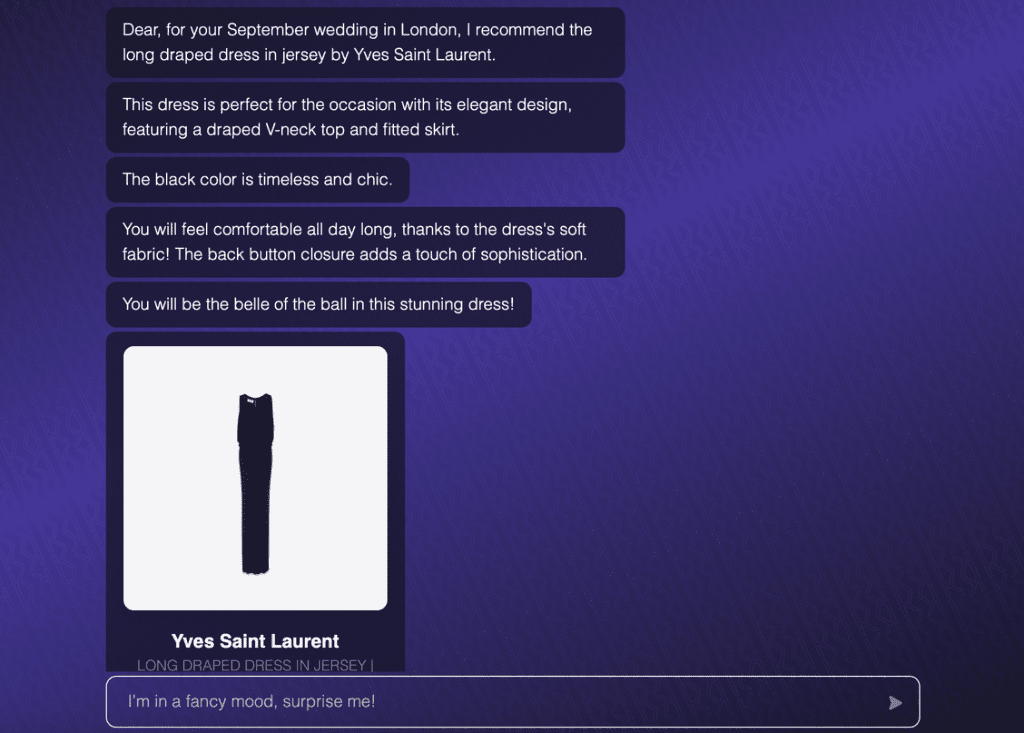The second annual Metaverse Fashion Week (“MVFW”) kicked off this week, and chances are, you were not exactly bombarded with info about it. (I certainly wasn’t.) The virtual event again drew big brands, such as Dolce & Gabbana, Balmain, Coach, and Tommy Hilfiger, and digitally native names like DressX and The Fabricant, but the fashion industry and corresponding media was observably less interested than they were in its ultimately-underwhelming debut last year.
If there is one notable takeaway from MVFW, it’s probably the fact that it was spread across multiple platforms (mirroring “real life” fashion weeks in this regard) this year. While the events mainly played out in Decentraland like last year, it has since grown to include experiences on metaverse platform Spatial and AR platform Over. “Though the tech does not yet exist to enable true interoperability – the seamless transfer of digital wearables across different metaverses – the fact that MFW’s organizers and participants are even attempting to conduct a live event across multiple platforms simultaneously marks a definitive step forward for proponents of an open, decentralized, and interoperable metaverse,” Decrypt’s Sander Lutz wrote this week.
THE BIGGER PICTURE: The relative lack of attention to/interest in this year’s MVFW, compared to Dior’s Pre-FW23 outing in Mumbai that also took place this week – as of Fri. AM, there were a total of 3,428 #MVFM hashtags on Instagram vs. 10,473 for #DiorFall23 (the house’s hashtag for the event) – very well might be a reflection of the bigger picture here. There has been something of a swift transformation of the metaverse >>> the “meh-taverse.” That is what the WSJ coined it this week in light of efforts by Disney, Microsoft, etc. to jump ship – or at least focus more heavily on other technologies, namely, AI in Meta’s case. Mark Zuckerberg seemed more enthusiastic about AI on an earnings call last month, which is particularly noteworthy given that Facebook, Inc. rebranded to Meta in a nod to the strength of its bet on the virtual world.
Chances are, AI is more tempting right now for co., including those in fashion/retail, because the metaverse that has been discussed over the past couple of years is still pretty far away from being a reality, and thus, AI is bringing much more immediate benefits. For example: “Thanks to our investments in areas such as tech, AI and the supply chain, we have improved precision and faster response times – giving our customers access to an even wider and more relevant assortment that is adjusted to regions, stores and online,” H&M’s CEO Helena Helmersson said on Thursday.
Another new example of how companies are using AI: KNXT, the innovation arm of Gucci-owner Kering, unveiled the “first AI personal shopper leveraging OpenAI’s ChatGPT” this week. The generative AI bot – called /madeline – provides consumers with a way to avoid the “endless scrolling” that comes with e-commerce via a new way “to find the perfect luxury pieces from prestigious houses.” I asked /madeline what I should wear to a wedding …

The state of funding continues to suggest that AI is the new “it” thing. Metaverse-centric funding (including for AR/VR ventures) has fallen, and VC cash is increasingly flowing into generative AI startups. Venture firms increased their funding in generative AI companies from $408 million in 2018 to $4.8B in 2021 to $4.5B in 2022, per Pitchbook data.
The BIG caveat: As I said in this month’s Enterprise exclusive deep dive, web3 tech is far from dead. However, its most attractive/viable use cases (for brands and their legal teams) look a lot less like digital asset tied NFTs & more like utility-focused applications of blockchain.
On the litigation front …
– Yuga Labs v. Ryder Ripps – A C.D. Cal. judge denied the defendants’ motion to stay the case until their Anti-SLAPP motion appeal is resolved by the 9th Cir., as: (1) a stay would harm Yuga & the public, (2) the Ds will not be harmed in the absence of a stay, and (3) Ds’ appeal “will not simplify any issues” in the case.
– Getty Images v. Stability AI – Getty filed an amended complaint this week (in this © and trademark infringement case) to add Stability AI, Ltd. as a defendant.
– Xavier v. Undefined, Inc. – Influencer Brittany Xavier is suing cosmetics co. Undefined for using her “image, likeness, and persona” w/o her consent to promote itself and products.
– RIP Magazine v. Redone and Hanesbrands – Hard rock magazine RIP is suing RE/DONE and Hanesbrands for trademark & unfair competition for allegedly co-opting its “Coconut Teaszer” trademark.
In some deal-making news …
– Gen Phoenix, which boasts the title of “the leading producer of sustainable recycled leather at scale, raised $18M in a round led by venture capital firm Material Impact, with participation from Dr. Martens, InMotion Ventures, the investment arm of Jaguar Land Rover & Coach and Kate Spade owner Tapestry.
– Fashinza has raised $30M in a new round led by Mars Growth Capital & Liquidity Group. The Gurgaon, India-based company operates an AI-powered B2B supply chain “marketplace” for fashion brands/retailers.
– British clothing chain Next Plc has agreed to buy fellow fashion brand Cath Kidston, which was recently placed into administration. For £8.5M ($10.5M), Next get the brand’s trademarks, domain names, and “other IP.”
– Bluestar Alliance announced its acquisition of Amsterdam-based Dutch fashion brand Scotch & Soda, which “will allow for [its] continuation across key markets including the Netherlands,” where it recently filed for bankruptcy.